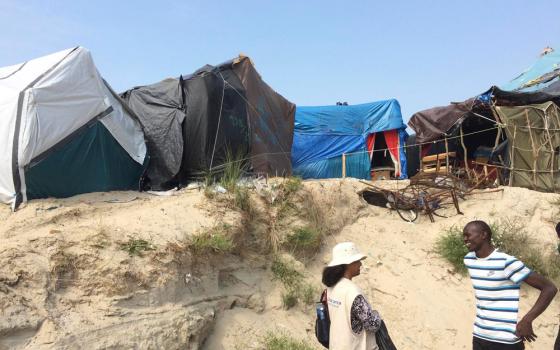The sun may very well be shining outside your window as you read these words, and yet, in many ways, we are surrounded by fog.
There is the fog of war that clouds our vision, colors our judgment, and makes us numb to the suffering of so many families living in the midst of perpetual war. There is the fog of poverty, racism and indifference that settles in and obscures possibility and promise across nations, cities and generations. There is the fog of uncertainty about the future and our corresponding inability to see even the outline of the path before us. Then there are the periodic pockets of individual fog in our lives, such as the fog that descends upon us when we mourn the passing of a dear friend or accompany a loved one through a serious illness.
We are surrounded by fog — lots and lots of fog. It is part of the human condition, and sometimes it seems as if we humans make it worse, acting as human fog machines that exacerbate the problem and increase the systemic causes of the fog of injustice clouding our way to peace.
Other humans, however, manage to live, love and lead in the midst of all the fog. My prayer these last few weeks has been filled with some of their stories and images.
My prayer upon waking this week has been for the safety of the ordinary folks who make up the Syrian Civil Defense force. Before the fog of war descended on their nation, these 3,000 volunteers were bakers, tailors and professionals. Today, they step daily into the cloud of dust and debris left in the wake of cluster bombs dropped upon civilian neighborhoods, digging survivors of all ages out from under the rubble.
PBS recently featured some of these rescue workers in an episode of "PBS NewsHour." The images and stories of these folks literally reaching out through the fog and debris of war, have stayed with me in my prayer.
"It's difficult to talk with our team every day," Raed Al Saleh, the director of Syrian Civil Defense, told the PBS reporter, "and most of the time, we have no answers to all the questions they ask." Yet they continue, responding to the aftermath of bomb blast upon bomb blast. To date, they have rescued almost 60,000 civilians.
"The hardest part is to get people under the rubble out," another rescue worker, Radi Saad, told PBS. "It's exhausting, and you don't have technical equipment to use. You have simple equipment. Often, the process of searching and rescuing takes 30 to 40 continuous hours. You get tired, but the hope inside you makes you forget, and you just keep going to try to reach the person who needs your help."
In the face of the extreme fog of war, these Syrian rescue workers reach out to those they can touch, the ones in their immediate line of vision or those just under the nearest pile of rubble. Blinded by fog and unsure of the path to peace, they nevertheless choose to live, love and lead in the fog.
The refugees living in a makeshift camp — called "the Jungle" — in Calais, France, have also been in my prayer these days. As a response to our congregation's commitment to welcome immigrants and refugees, this month, my religious community sent two representatives, a sister and an associate, to join the Catholic Worker's ministry of presence to these refugees at the Maria Skobtsova House. Two other associates will volunteer in Calais next month.
Sr. Sheena George and associate Frank McCann have spent three weeks living with other volunteers and visiting refugees from Sudan, Afghanistan, Pakistan, Iran and Syria who live in the camp or are admitted to the local hospital.
"The cloud of despair blanketing the camp is thick and relentless," Sister Sheena writes in a blog post. Frank and Sister Sheena have said that while they went to Calais as a way to live out our congregation's commitment to hospitality and welcome, they have been welcomed again and again by refugees sharing what little food or tea they have. Even in the fog of despair and uncertainty about their future, these brave souls far from home open their temporary homes and give an abundance from their scarcity.
Sister Sheena writes that a growing sense of compassion is taking root in herself and others in Calais: "This feeling of compassion is not merely a sentimental response with no practical or long-term effects. It is the embodiment of Christ's love, grounded in human rights and dignity."
After a long day walking in the Jungle, she finds herself "praying for a greater congruence of compassion at both the government and individual levels that will facilitate an end to the suffering and marginalization of this large faction of Christ's people."
Safe in my own home, I find myself ending my day praying for those living in the Jungle, fleeing violence, war and economic poverty in their home countries. I pray too for their loved ones at home who worry for their safety, and I am glad that my own loved ones are there with them, accompanying them in the fog.
Prayer is key to living, loving and leading in fog. My own reflections on this time of fog have been fed by Sr. Pat Farrell's keynote address at the 2016 assembly of the Leadership Conference of Women Religious:
"This is our moment. The world around us teeters on the edge of both peril and promise. Breakdown and breakthrough tussle with each other. The path forward is hidden in fog. It is your time to lead. To do so, you must learn to be led and to listen deeply. Together, we will discover personal and communal processes for deep prayer and dialogue. We will be given what we need to tend the soul of our communities by nurturing contemplative spaciousness."
She was, of course, speaking to leaders of religious congregations of women. As a member of my own congregation leadership team, I will admit to often feeling like I am in the fog. There is the fog of grief and loss that is such a part of religious life these days as our elders transition to the next phase of their journey with God. There is the fog of uncertainty as we face yet another period of transition and transformation. Only God knows where this path we are on will lead, which is why Pat's clear message was such an important one for me to hear. In order to lead in fog, we must first be led.
Rather than lament that I find myself surrounded by fog, the invitation is to "learn to be led and to listen deeply." And so I listen to the stories of those who live and love in the midst of fog. I let their example wash over and transform me. I pay attention to the space that is between us, soak in the light and love that is there even in the darkness, and trust that we will indeed be given what we need. I am becoming convinced that presence is the only way through the fog. My job is to show up and make the time and space for contemplative practice in the midst of it all.
[Susan Rose Francois is a member of the Congregation Leadership Team for the Sisters of St. Joseph of Peace. She was a Bernardin scholar at Catholic Theological Union and has ministered as a justice educator and advocate. Read more of her work on her blog, At the Corner of Susan and St. Joseph.]


